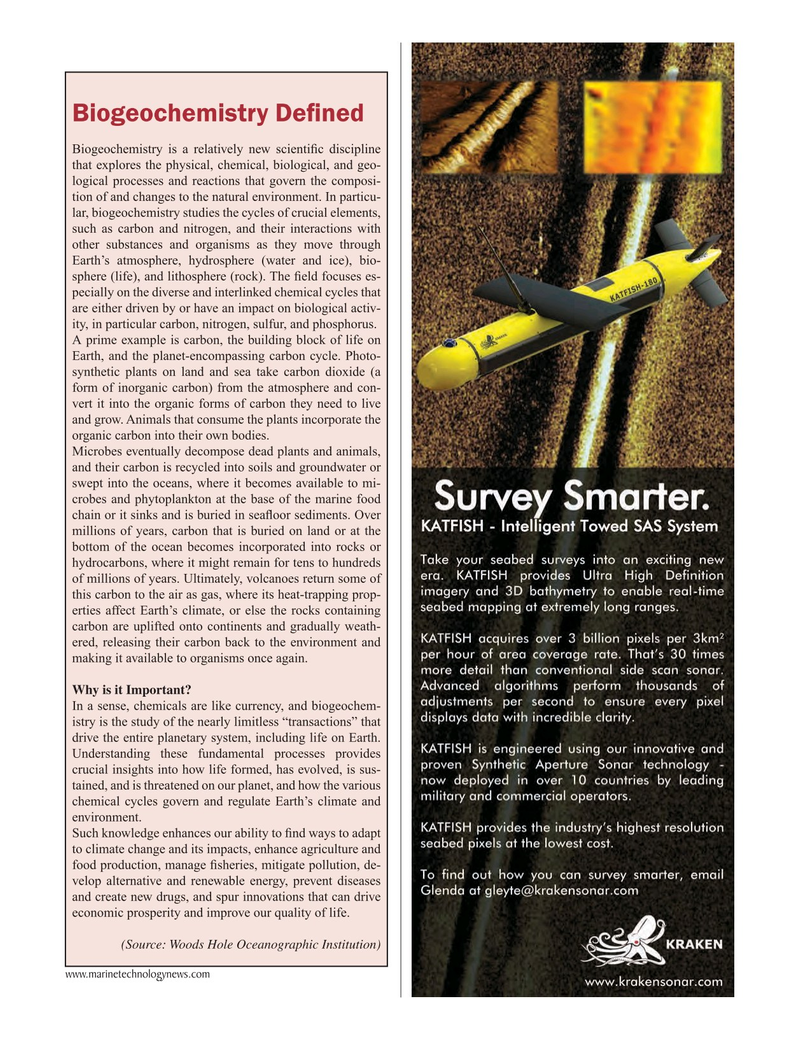
Page 13: of Marine Technology Magazine (April 2016)
Offshore Energy Annual
Read this page in Pdf, Flash or Html5 edition of April 2016 Marine Technology Magazine
Biogeochemistry De? ned
Biogeochemistry is a relatively new scienti? c discipline that explores the physical, chemical, biological, and geo- logical processes and reactions that govern the composi- tion of and changes to the natural environment. In particu- lar, biogeochemistry studies the cycles of crucial elements, such as carbon and nitrogen, and their interactions with other substances and organisms as they move through
Earth’s atmosphere, hydrosphere (water and ice), bio- sphere (life), and lithosphere (rock). The ? eld focuses es- pecially on the diverse and interlinked chemical cycles that are either driven by or have an impact on biological activ- ity, in particular carbon, nitrogen, sulfur, and phosphorus.
A prime example is carbon, the building block of life on
Earth, and the planet-encompassing carbon cycle. Photo- synthetic plants on land and sea take carbon dioxide (a form of inorganic carbon) from the atmosphere and con- vert it into the organic forms of carbon they need to live and grow. Animals that consume the plants incorporate the organic carbon into their own bodies.
Microbes eventually decompose dead plants and animals, and their carbon is recycled into soils and groundwater or swept into the oceans, where it becomes available to mi- crobes and phytoplankton at the base of the marine food chain or it sinks and is buried in sea? oor sediments. Over millions of years, carbon that is buried on land or at the bottom of the ocean becomes incorporated into rocks or hydrocarbons, where it might remain for tens to hundreds of millions of years. Ultimately, volcanoes return some of this carbon to the air as gas, where its heat-trapping prop- erties affect Earth’s climate, or else the rocks containing carbon are uplifted onto continents and gradually weath- ered, releasing their carbon back to the environment and making it available to organisms once again.
Why is it Important?
In a sense, chemicals are like currency, and biogeochem- istry is the study of the nearly limitless “transactions” that drive the entire planetary system, including life on Earth.
Understanding these fundamental processes provides crucial insights into how life formed, has evolved, is sus- tained, and is threatened on our planet, and how the various chemical cycles govern and regulate Earth’s climate and environment.
Such knowledge enhances our ability to ? nd ways to adapt to climate change and its impacts, enhance agriculture and food production, manage ? sheries, mitigate pollution, de- velop alternative and renewable energy, prevent diseases and create new drugs, and spur innovations that can drive economic prosperity and improve our quality of life.
(Source: Woods Hole Oceanographic Institution) www.marinetechnologynews.com
MTR #3 (1-17).indd 13 4/4/2016 12:09:21 PM

 12
12

 14
14
